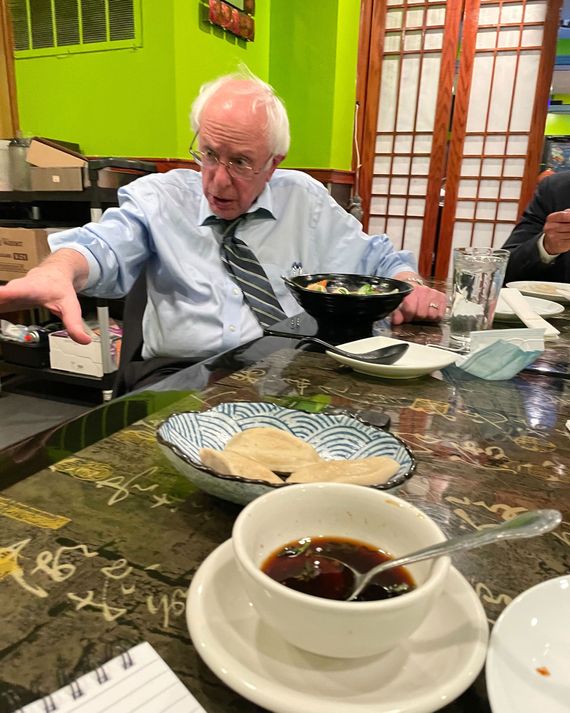
This article was featured in One Great Story, New York’s reading recommendation newsletter. Sign up here to get it nightly.
The senator had no idea it was Valentine’s Day. “When is that? This weekend?” Bernie Sanders asked when I greeted him for dinner on February 14 at Young Chow, a Chinese restaurant on Pennsylvania Avenue that he likes. No, I told him, it is Valentine’s Day currently, right now, as this very meal is taking place. He was grumpy. “Why is Valentine’s Day in the middle of the week?”
Not that I was expecting a softer, sweeter Sanders just because of the holiday. Or even because he is 81 years old and has been a politician for much longer than I’ve been alive. This date would have no frills. We drank ice water. We ordered right away (him: pork noodle soup; me: dumplings). He wasn’t in the mood for chitchat. “Are we talking about my book?” he replied, when I asked if the flying objects that had been shot down over the United States in the past few days were aliens. (The eventual answer was deadpan: “Don’t you think if people from another universe were gonna come to the United States, they could do a little bit better?”) When a young woman rushed into the back room where we were sitting to ask for a photo, he kindly but bluntly told her to take it quickly. “You’re Bernie Sanders. Are you serious?!” she kept repeating. He was.
His book, It’s OK to Be Angry About Capitalism, out next week, is a riff on themes from his presidential runs in 2016 and 2020: America is an oligopoly, politicians are complicit, and the media is biased. Not a lot is new, but this time Sanders has defined an even sicker system he calls Über-capitalism. The oligarchs are greedier and acting with near-total impunity. As he put it to me, “Every goddamn thing is money, money. And lies and lies. And corruption and corruption and corruption.” He talked in numbers and facts, a relentless drumbeat of injustices from which it was hard to steer him away: Did I know BlackRock, Vanguard, and State Street control $20 trillion worth of assets? Was I aware that the weekly wage for many American workers, adjusted for inflation, is actually lower than it was 50 years ago?
“No one says to me, ‘Bernie, what do you think about three people owning more wealth than the bottom half of American society?’” he complained. “Isn’t that because we already know what you think?” I asked. “It’s not just me!” he shot back. “They don’t ask anybody!” When our dinner arrived, it was served by the owner of Young Chow and her teenage daughter, who was breathing heavily, having jumped in her car, driven all the way from McLean, and run into the restaurant to serve Sanders his soup.
Sanders may remain a dyspeptic outsider in disposition, but he is more powerfully entrenched than he has ever been, having recently been appointed chair of the Senate Health, Education, Labor, and Pensions Committee, which gives him a perch to go after some of his favorite targets: Big Pharma executives and insurance companies, union-busting bosses like Howard Schultz of Starbucks, predatory for-profit colleges, railroad companies refusing to provide adequate sick leave. I told Sanders I read a Politico story that was basically a bunch of lobbyists saying they are afraid to work with him. “Good,” he said. “They should be.”
Despite how angry he is, Sanders seems to be finally enjoying himself. Maybe it’s because he can vent his spleen without being called insane or ridiculous or a communist by members of his own party. After the president’s State of the Union, in which he called for a billionaire tax, The Wall Street Journal declared, “Joe Biden Is Bernie Sanders.” The senator has undeniably shaped the agenda of the very centrists who wrested the Democratic nomination from him on Super Tuesday 2020 more than they probably care to admit. He is proud of making big government great again and helping Biden aspire to an FDR-size presidency, no matter how far he has fallen short. “If, five years ago, somebody said, ‘We’re gonna spend $1.9 trillion on the needs of the working class of this country,’ people would’ve said, ‘You’re crazy,’” Sanders said of the American Rescue Act, which he helped draft as chair of the Senate Budget Committee in 2021. “Well, no one said it this time. Biden was there. It was very popular.”
He’s also clear-eyed about what happened after: the debacle of the Build Back Better–bill negotiations, which constituted what he calls in his book “one of the most difficult, demanding, and demoralizing years” of his three decades in Congress. “It would’ve done for working people what had not been done since the 1930s,” he said of the bill, laying the blame squarely for its failure at the feet of his colleagues Joe Manchin and Kyrsten Sinema, who “sabotaged it and we lost. They played a horrific role.”
So did Biden get pushed to the left by progressives, or did he subsume them? If there’s still so much capitalism to be angry about, so much left to do, why has no challenger, Sanders included, stepped up to take on Biden in 2024? And for all the disappointments of his presidency from the left’s perspective, what is the need for revolutionary fervor if Democrats in Congress have proved themselves capable of passing not only the Rescue Act, but an infrastructure bill, the Inflation Reduction Act, and other major legislation? “There is a general consensus out there that Biden is by no means the kind of progressive that we would like to see,” Sanders agreed. “But on the other hand, he’s better than people anticipated.” He got prickly when I pushed him on the relative docility of Biden’s left flank. “You’re getting off the subject of the book,” he chastised. “You’re asking me about my political future, why I’m not running against Biden. Well, I am not the only person in the world.”
If Sanders seems resigned, even defensive, it’s because he knows he doesn’t have many options. He will be 83 when his seat comes up for reelection in 2024, and the current Congress is mired in partisan muck. “Am I gonna accomplish Medicare for All? No, I will not,” he told me matter-of-factly as we finished eating. “But can I greatly expand primary health care in America? Can I lower the cost of prescription drugs? Maybe. Is it revolutionary? No. Will it impact the lives of tens of millions of people? Maybe.” You could say, at this stage in his career, that he’s a kind of incrementalist by necessity. He’s a movement, but he’s also just one guy — “an elected official,” he reminded me.
When the time came to pay the bill, the owner of the restaurant was joined not just by her daughter but by her son and two friends, who stuck a pile of printed-out pictures of their parents and history teachers for the senator to sign. They all wanted photos. “How many you got for me?” he bellowed and signed them all, drawing the line at recording a TikTok in support of a lacrosse team. The owner told Sanders her father had only graduated from the sixth grade; now her older daughter was at Stanford. He put both his hands on her shoulders and told her his father didn’t graduate high school. As we stepped out the front door, he told me, a little wistfully, “It’s a beautiful story.” I suggested that maybe he should send a text to his wife, Jane, since it was Valentine’s Day. “Okay, okay,” he said, waving me off.
More on Bernie Sanders
- Bernie Sanders’s Pressure Campaign on Democrats Over Israel
- Biden Should Follow Bernie Sanders on Conditions for Israel
- AOC Is Just a Regular Old Democrat Now






























